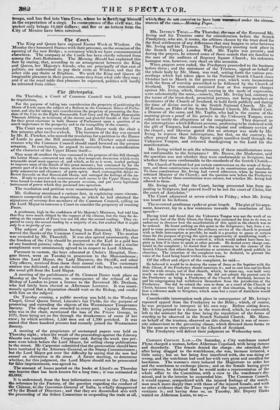MR. IRVING'S Truat.—On Thursday, thevase of the Reverend Mr. Irving
and his Trustees came• for consideration before the Scotch Presbytery, who are, it seems, the arbiters chosen by the trust deed for the final settlement of any differences that may happen to arise between Mr. Irving and his Trustees. The Presbytery meeting took place in the Scotch Chapel, London Wall. Mr. Taplin was present ; and during the prayers, he uttered some of those sounds that are familiar to the ears of the auditors of Regency Square Church; his unknown harangue was, however, very short on this occasion.
When prayers were ended, the Presbytery proceeded to the business before them; and the statement of the Trustees, signed on behalf of the whole body by Mr. Mann, was read, setting forth the various pro- ceedings which had taken place in the National Scotch Church since October last to March in thd present year, which were inconsistent with the form of worship prescribed to be followed by the Church of Scotland. The statement contained four or five separate charges against Mr. Irving, which, though varying in the mode of expression, were substantially the same,—namely, that Mr. Irving had, contrary to the terms of the trust-deed, permitted persons, not being members or licentiates of the Church of Scotland, to hold forth publicly and during the time of divine service in the Scotch National Church. Mr. D. M'Kenzie, an Elder of the Scotch National Church, Mr. David Carr,
a Deacon of the same, and Mr. Taplin, who had in the course of the morning given a proof of his powers in the Unknown Tongue, were called to verify the allegations of the complainers. They deposed to the interruptions which different persons, professing to be endowed with the gift of Tongues, had caused to the regular' and ordinary service of
the chapel ; and likewise stated that no attempt was made by Mr. Irving to repress those interruptions, but that, on the contrary, he often prayed that the Holy Spirit might manifest itself through the Unknown Tongue, and returned thanksgiving to the Lord for the manifestation.
Mr. Irving wished to ask the witnesses, if these manifestations were not conformable to the Scriptures ? Mr. Brown, the Moderator, said the question was not whether they were conformable to Scripture, but whether they were conformable to the standards of the Scotch Church—
The Church of Scotland had put certain constructions on the words of Scrip- ture, and those constructions were embodied in its constitutions and standards. To those constitutions Mr. Irving had vowed adherence, when he became an ordained Minister of the Church; and the question now before the Presbytery was, not whether those constitutions were correct, but whether Mr. Irving had adhered to them.
Mr. Irving said, "that the Court, having prevented him from ap- pealing to Scripture, had proved itself to be not the court of Christ, but the court of Antichrist."
The Court adjourned at seven o'clock to Friday; when Mr. Irving was heard in his defence.
The reverend gentleman spoke at great length. The gist of his argu- ment, however, lay in a few sentences towards the conclusion of his speech—
Having tried and found that the Unknown Tongue was not the work of an evil spirit, but of the Holy Ghost, the thing that remained for him 'to do was, to endeavour to discover how the manifestation of this spirit in the church was to be ordered. He found nothing on this point in the Scriptures ; but, from a re- gard to some persons who wished the ordinary service of the church to proceed with as little interruption as possible, he made it a practice to pause at certain times for the purpose of giving the spirit an opportunity of manifesting itself,— without, however, attempting to'control it, which would indeed have been im- piety in him if it chose to speak at other periods. He denied every charge con- tained in the complaint ; lie denied that it was contrary to the canons of the Scotch Church that others than licentiates or ministers should speak publicly in churches. The intention of the complaint was, he declared, to prevent the voice of the Lord being heard within his own house.
Of the effect and object of the complaint, he said— He believed it would be to destroy the name of Jesus as the baptizer with the Holy Ghost, if the Presbytery should entertain it; and to cast him and his flock into the wide streets, out of that church) which, he must say, was built very much on the credit of his own name. He did not submit the present case to the Presbytery as being a Presbytery of the Church of Scotland, because he and his congregation had withdrawn themselves from the jurisdiction of the Presbytery. Nor did he submit the case to them as a court of the Church of Christ, because they had put themselves out of that situation, by refusing to hear a reference made to Scripture, which none but a court of Antichrist would have done.
Considerable interruption took place in consequence of Mr. Irving's repeated appeal from the Presbytery to the Bible ; which, of course, he was prepared to interpret in his own way. Before sitting down, Mr. Irving pointed to a clause in the trust-deed, which, he contended, left to the minister for the time being the regulation of the forms of worship to be observed in the Scotch National Church. Mr. Mann, on behalf of the trustees, observed on this clause, that it was of neces- sity subservient to the governing clause, which directed these forms to be the same as were observed in the Church of Scotland.
The Presbytery will deliver their judgment on Wednesday next.


























 Previous page
Previous page